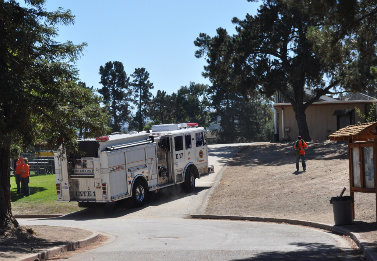 Class tensions, injuries result from lax regulations
Class tensions, injuries result from lax regulationsBut did it really ruin the Powderpuff experience?
 First, let’s go back to the semi-final game between the sophomores and juniors on Sept. 23. Administration had not yet imposed the running play prohibition, so the flag football players could still mercilessly ram and stomp over each other to gain or maintain control over the ball. The players knocked each other over and fell, but no penalties were called—that is, until someone got hurt because blocking and body contact were encouraged by running plays.
First, let’s go back to the semi-final game between the sophomores and juniors on Sept. 23. Administration had not yet imposed the running play prohibition, so the flag football players could still mercilessly ram and stomp over each other to gain or maintain control over the ball. The players knocked each other over and fell, but no penalties were called—that is, until someone got hurt because blocking and body contact were encouraged by running plays.
Before Sept. 23, there had already been some notable injuries in Powderpuff. Last year, senior Alex Chiu tore her ACL. But after junior Gabriella Ley suffered her knee injury, administration decided to intervene directly and stop the game for halftime. Sophomore Hadar Sachs then sprained her ankle, leading administration to cancel the game for the day and ask the already-solemn audience to leave the stands quietly. Moreover, already-strained class tensions were strained even more to the extent that students from all classes began to blame each other for the accidental injuries.
Wasn’t Powderpuff supposed to be fun without regulations? Guess not.
Once running plays were prohibited, people were still getting hurt, but none of the injuries were as severe; a sophomore, for example, was knocked over while on defense during the second preliminary game, but she required no serious medical attention. No longer were fast-moving players running into hordes of opposing players, and no longer were girls running for more than just a few seconds. The decrease in running and tackling translated to a decrease in risk as well because the receivers were moving much more slowly compared to runners and also took more time to accelerate once they had the ball. Less speed and less momentum meant fewer injuries and fewer ambulances.
Because of these regulations, the championship game was much less violent. Indeed, players were still rough with each other, but that is a part of football that can never be taken away. The regulations did take away unnecessary speed because all of the players were slowing their running paces in order to increase their chances of catching the ball.
Though the tighter regulations limited the variety of football plays, they were not meant to take the fun out of Powderpuff. Unfortunately, the previous injuries had already accomplished that result. The controls actually benefit the Powderpuff experience because no one wants their memories of Homecoming to be tainted with horrible and unnecessary injuries. In fact, the addition of more regulations, such as penalizing aggressive players with technical fouls and the possibility of being removed from the tournament, can only benefit the experience even more by discouraging excessive and unnecessary body contact. Only with tight regulations is it possible for us to have a safe Powderpuff experience that is, most importantly, exciting and fun.








